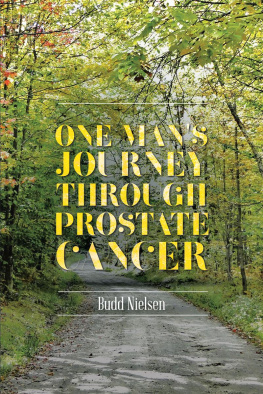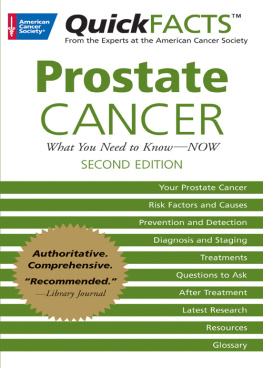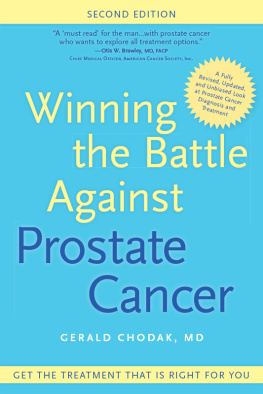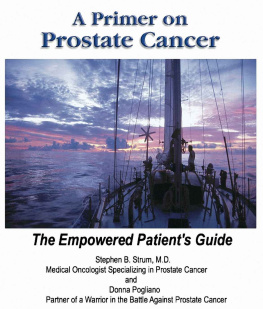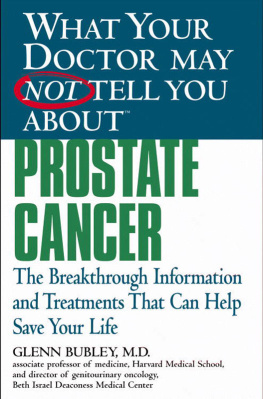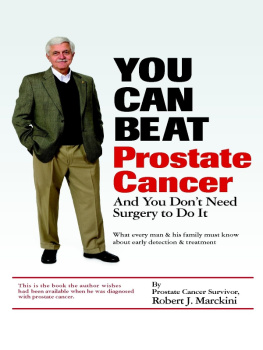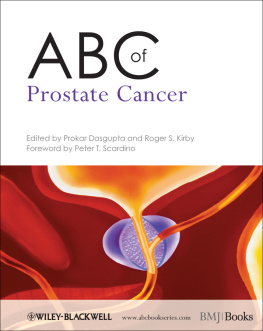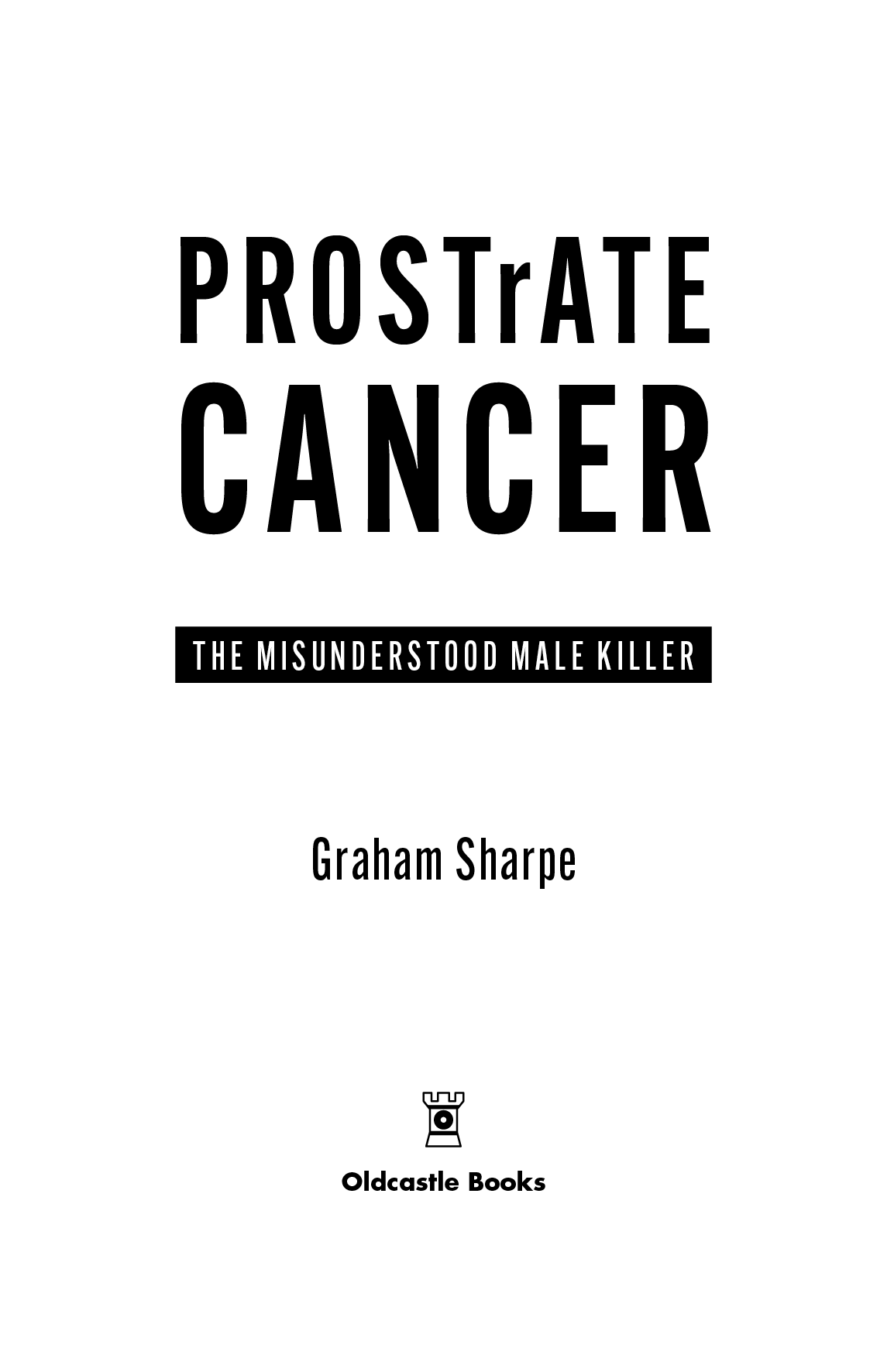THIS BOOK IS DEDICATED
to anyone who believes there are two Rs in PROSTATE
I hope you dont have to learn the hard way how to tell
your Rs from your elbow!
Letter in the Metro , 25 June 2021
I have lost count of the number of friends I know who
have complained of prostrate problems. I have
stopped bothering to correct them.
Ben Mundy, of Wells, Somerset.
FOREWORD
WHEN GRAHAM told me he had been diagnosed with Prostate Cancer it was at first a shock, but after I had taken the news in, all the previous GP and hospital visits he had been taking made sense.
He did not want anyone to be told, which I really didnt like at all. That was something that I couldnt do. So I made the decision to tell our two sons.
Our elder son, Steeven, lives in New Zealand, and we were going there to see him and his family for Christmas and New Year. I told him shortly after we arrived, and he took the news very well.
I then told Paul when we returned home, and it was agreed that when I updated him on Gs treatment and how he was feeling, he would keep Steeven in the loop.
This worked very well, and I felt much better, knowing that they were aware of what was happening. Graham was completely unaware that I had told them, but I felt then, and still feel now, that what I did was the right thing to do.
And now he knows what I did as I have just told him.
Sheila Sharpe
INTRODUCTION
IN WHICH I PROSTRATE MYSELF
I VAGUELY recall having read an article many years ago, one phrase of which stuck in my memory: Most people affected by the disease will die with prostate cancer, rather than from it. Thus it had never occurred to me to worry about the consequences of being diagnosed with prostate cancer, or PC, as I have come to call it. As a result of having read that article I did, though, at least become aware of the spelling and pronunciation of the word prostate.
Very few people none, as far as I can recall have ever told me of the time they found themselves or someone else prostate on the ground. Those who wish to, almost invariably use the correct word for that phrase prostrate. There seems to be little confusion about the correct usage of the word prostrate in these circumstances. But many people have spoken to me about themselves or others being a victim of prostrate cancer.
I wonder why it is that a comparatively significant percentage of those who find themselves having to deal with the condition, or who are speaking of others who already have it, appear to struggle to name it correctly. I dont find it disrespectful or upsetting when people use the wrong terminology, but it does strike me that perhaps there is an unwillingness amongst men of a certain age, predominantly those who are not suffering from this extremely common cancer amongst males of advancing years, to confront it. To the extent that they either genuinely do not, cannot, or will not absorb the pronunciation of the disease they fear that they, too, may find themselves having to deal with at some stage of their lives.
When those who are diagnosed with PC endure the ritual of confirmation, they may be temporarily shocked into a state of mind which doesnt want to take in the enormity of what they are being told. Or they may feel that they have no intention of recognising the severity of the position into which they have just been inserted, for fear of the next step being to accept the potentially fatal consequences. Perhaps part of their rejection of the concept of having the disease manifests as not allowing its name to register. Or maybe and this seems very unlikely there are just too many hard of hearing, and/or illiterate men who are diagnosed with what they hear as prostrate cancer, possibly by less than clearly enunciating doctors, medics, specialists, consultants or oncologists.
Whether one calls it prostate or prostrate wont affect the ultimate outcome, but, get it right, and at least you wont be accused of not even knowing what youve been diagnosed with. Unless the accusation comes from someone who believes it really is called prostrate cancer, of course
IN WHICH MS MCNULTY BECOMES
MY HEROINE
COME IN, Mr Sharpe sit down I have to tell you that you have prostate cancer Oh, would you excuse me? Im on call today
The consultant stood up to answer his ringing mobile, and walked out of the room, while I sat trying to process what hed just told me. He returned shortly after and began to tell me about his diagnosis: Sorry about that, Mr Sharpe. Where was I? Ah yes, you have prostate cancer, and
His mobile was ringing again. Sorry, I have to take this, Im on call He stood up again, and, speaking into the mobile, left the room.
Im not usually backward about coming forward, and when this happened yet again, I was thinking, Im really not happy about this. He may be on call, but for all I know hes just told me I have a death sentence hanging over me, and he cant be bothered to turn his phone off. I wont be responsible for my actions if he does it
again.
The Macmillan nurse who had also been sitting quietly in the room with us must have sensed my possibly murderous thoughts.
Okay, come with me, Mr Sharpe, Ill explain what he should be telling you. She walked out of the room, and I followed her into her office across the corridor. I never saw the consultant again
In all probability, this will not be the way in which, if it is going to happen to you and the chances are relatively high that it could, if you are male and aged 50-plus the news will be broken. Much more likely is that you will find out as Ron Arnold did, someone I hadnt known prior to the pair of us eventually sitting close to each other in a waiting room in Mount Vernon Cancer Centre, waiting to undergo our radiotherapy treatment. We would soon become firm friends.
It was Thursday 4 October 2018, that Ron, then 73 years old, went to his 4pm appointment to be told the results from the biopsy he had recently undergone: We sat down in his consulting room. He had a serious face. Cant remember his exact words. Something like: Mr Arnold, Im afraid it has been confirmed that you have prostate cancer.
Ron remembers that he responded to the news with something like, Okay, I thought so what do we do next?
He was told that the next procedure should be a bone scan to make sure that it has not spread if it has it will require a totally different type of treatment. Ron replied: Okay, now it has been established that I have it How will I react, and how is it going to be dealt with?
Stay with me and youll find out how Ron and I got on
Just a day or two after my bluntly, brutally and insensitively delivered consultants verdict, I received a letter dated 16 August 2018 from Fiona McNulty ( sic ), my Macmillan urology nurse and a copy of what she had written to my GP, Dr K, informing him of my Cancer Diagnosis: Prostate-C61.
As I write this two and a half years later, I still have no idea what C61 means, so I google it, and up comes the following information: C61 is a billable ICD code used to specify a diagnosis of malignant neoplasm of prostate. A billable code is detailed enough to be used to specify a medical diagnosis.
Thats interesting, but leaves me very little the wiser, so I google malignant neoplasm of prostate then wish I hadnt, when I read this: A malignant neoplasm is basically cancer. Of the various types of neoplasm, this is the most severe as it can invade surrounding organs and tissues and also spread to other parts of the body through metastasis. During this process, cells break off of the neoplasm and travel through the blood vessels to other parts of the body. Sounds a little daunting. Im glad I didnt know that when I started my treatment


